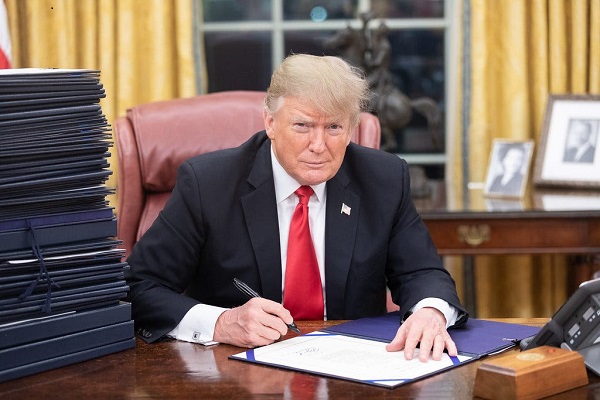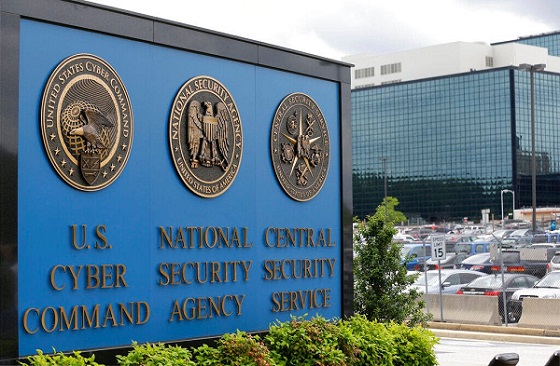Christopher Rufo
Trump Abolishes DEI for the Feds

The two-year campaign for colorblind equality notches its biggest win yet.
Yesterday, President Trump signed an executive order abolishing the “diversity, equity, and inclusion” bureaucracy in the federal government.
The move marks a stunning reversal of fortune from just four years ago, when Black Lives Matter, critical race theory, and DEI seemed unstoppable. Following the death of George Floyd, left-wing race activists made a blitz through America’s institutions, rewriting school curricula, altering government policy, and establishing DEI offices in major universities, big-city school districts, and Fortune 100 companies. The Biden administration immediately followed suit, mandating a “whole-of-government equity agenda” that entrenched DEI in the federal government.
No more. President Trump has rescinded the Biden executive order and instructed his Cabinet to “terminate, to the maximum extent allowed by law, all DEI, DEIA, and ‘environmental justice’ offices and positions,” and “all ‘equity action plans,’ ‘equity’ actions, initiatives, or programs.” In other words, President Trump has signed the death warrant for DEI within the federal government.
How did we get here? Through patiently building a movement and winning the public debate. At the beginning of 2023, I worked with Florida governor Ron DeSantis to launch the “abolish DEI” campaign. We began by terminating the DEI bureaucracy at New College of Florida, a small public university in Sarasota, where I serve as a trustee. The reaction from the racialist Left was intense. Protesters descended on the campus and the left-wing media published hundreds of articles condemning the move. But we held firm and made the case that public institutions should judge individuals based on their accomplishments, rather than their ancestry.
The argument began to take hold. The polling data indicated that Americans supported a “colorblind society” over a “race-conscious society” by large margins. Even the New York Times, one of the largest boosters of left-wing racialism, started publishing pieces that criticized DEI. At the same time, the Black Lives Matter movement was ensnared in scandals and the leading intellectual voices of DEI, such as Ibram X. Kendi and Robin DiAngelo, faced sustained public scrutiny and seemed to disappear from the spotlight.
We pushed onward. Governor DeSantis led the way, signing legislation abolishing the DEI bureaucracy in all of Florida’s public universities. A dozen other red states followed, restricting DEI programs and banning DEI-style discrimination in their public institutions. The process became a virtuous cycle: each state that passed an anti-DEI bill reduced the risk of the next state doing the same. The campaign moved from the realm of debate to the realm of policy.
Trump’s victory over Kamala Harris on November 5 sealed DEI’s fate. Corporate America, including companies such as Walmart, and Meta, interpreted the event as an incentive to change, voluntarily terminating their DEI programs before Trump took office. Mark Zuckerberg made it explicit, arguing that the country had reached a “cultural tipping point,” which convinced him to stop DEI programs. And Zuckerberg, along with numerous other tech titans, were prominently seated at the inauguration yesterday.
In one way, Trump’s executive order yesterday was priced in—people knew it was coming. Still, it is a crowning achievement for those who have built this campaign from the ground up. There will be many fights ahead—the bureaucracy will attempt to evade the order, and more needs doing on civil rights reform in general—but, for the moment, we should celebrate. The forces of left-wing racialism are on the defensive, and the forces of colorblind equality are on the move.
None of it was inevitable—and nothing will be going forward, either. It has taken courage, hard work, and more than a little luck. But this is undoubtedly a moment to feel optimistic. America’s institutions are not beyond correction, as many feared. The American people were wise enough to realize that their country might not have survived four or eight more years of government by DEI. The spoke on November 5, and now President Trump is acting accordingly.
Christopher F. Rufo is a Senior Fellow of the Manhattan Institute, Contributing Editor of City Journal, Distinguished Fellow of Hillsdale College, and founder of American Studio, a nonprofit organization dedicated to creating new work about the American experience.
The hub for all of my work on critical race theory, gender ideology, institutional capture, and social decay.
Automotive
Trump Must Act to Halt the Tesla Terror Campaign

 Christopher F. Rufo
Christopher F. Rufo
The Left’s splintering violence threatens a veto over democratic power.
Elon Musk finds himself at the fulcrum of American life. His companies are leading the field across the automotive, space, robotics, and AI industries. His ownership of the social platform X gives him significant influence over political discourse. And his DOGE initiative represents the single greatest threat to the permanent administrative state. Musk is arguably the most powerful man in the United States, including President Trump.
The Left has taken notice. Left-wing activists have long practiced a tactic called “power mapping,” which entails diagramming the opposing political movement and identifying “chokepoints.” They have designated Musk as one such chokepoint. This month, activists claimed to have organized 500 protests against Elon Musk’s Tesla—dubbed the “Tesla Takedown”—with demonstrations outside sales lots and a series of incidents of vandalism, property destruction, and fire bombings. A pattern has also emerged of individuals scratching or spray-painting parked Teslas, looking to intimidate owners and potential owners or just to express hatred of Musk.
Precedents exist for this kind of escalation. In the 1970s, following the frustrations of the civil rights era, left-wing splinter groups launched targeted terror campaigns and symbolic acts of violence. They bombed the U.S. Capitol, assassinated police officers, and even self-immolated in imitation of Buddhist monks. We may be entering a similar phase today, as the collapse of the Black Lives Matter movement gives rise to radicalized left-wing factions willing to embrace violence. If so, Musk’s Tesla may be the Number One target.
What, exactly, motivates this campaign? At its core, the Left appears to be shifting from an “antiracist” narrative to an anti-wealth one—from a racial frame to an economic one. The sentiment driving the Tesla Takedown is rooted in economic resentment and a desire for leveling. Musk has become a symbol of everything progressives oppose: oligarchy, capitalism, wealth, and innovation. These, in their view, are marks of the oppressor. They scorn the futuristic Cybertruck, SpaceX rockets, and Optimus robots, believing that such creations should be dismantled and repurposed into chassis for public buses or I-beams for public housing.
A certain element of left-wing Luddism is at work here, but the greater part of these activists’ motives is resentment. Musk represents the triumph of the great man of industry, something the Left believes should not exist.
Unfortunately, the Tesla Takedown may succeed. The Left has likely identified Tesla as a chokepoint because it’s easier to dissuade consumers from buying a car they associate with a malevolent political cause—or fear might be vandalized—than it is to persuade them to buy one in support of Musk and DOGE. When it comes to purchasing a Tesla, fear among the average American is a more powerful motivator than enthusiasm among the MAGA base.
Some evidence suggests that the campaign has made an economic impact. Tesla stock peaked around the time of President Trump’s inauguration and since then has lost approximately 40 percent of its value. Musk has accumulated more power than any other American, but that means that he has more points of vulnerability. His wealth and power are tied to his companies—most importantly, his consumer car company, which depends on individual purchases rather than institutional contracts (like SpaceX).
Trump has signaled that he understands this dilemma. He appeared at the White House in a Tesla and has voiced support for Musk’s firms. Justice Department prosecutors—and their allies in state government—must translate this support into policy by identifying and punishing those who destroy property as a means of political intimidation.
The administration needs to make clear that radical left-wing factions cannot use violence to wield a veto over democratic governance. If the partnership between Trump and Musk is to produce meaningful results, it must be backed by the full protection of the law.
Business
The NSA’s Secret Sex Chats

|
|
Intelligence officials maintained a chatroom to discuss polyamory and transgender surgeries, internal documents reveal.
The “intelligence community” is one of the most powerful parts of the American national security apparatus. In theory, it works tirelessly to keep the nation safe. But according to internal documents that we obtained, some intelligence agency employees have another on-the-job priority: sex chats.
We have cultivated sources within the National Security Agency—one current employee and one former employee—who have provided chat logs from the NSA’s Intelink messaging program. According to an NSA press official, “All NSA employees sign agreements stating that publishing non-mission related material on Intelink is a usage violation and will result in disciplinary action.” Nonetheless, these logs, dating back two years, are lurid, featuring wide-ranging discussions of sex, kink, polyamory, and castration.
One popular chat topic was male-to-female transgender surgery, which involves surgically removing the penis and turning it into an artificial vagina. “[M]ine is everything,” said one male who claimed to have had gender reconstruction surgery. “[I]’ve found that i like being penetrated (never liked it before GRS), but all the rest is just as important as well.” Another intelligence official boasted that genital surgery allowed him “to wear leggings or bikinis without having to wear a gaff under it.”
These employees discussed hair removal, estrogen injections, and the experience of sexual pleasure post-castration. “[G]etting my butthole zapped by a laser was . . . shocking,” said one transgender-identifying intel employee who spent thousands on hair removal. “Look, I just enjoy helping other people experience boobs,” said another about estrogen treatments. “[O]ne of the weirdest things that gives me euphoria is when i pee, i don’t have to push anything down to make sure it aims right,” a Defense Intelligence Agency employee added.
These revelations come at a moment of heightened scrutiny for the intelligence community. President Donald Trump, Defense Secretary Pete Hegseth, and Director of National Intelligence Tulsi Gabbard have each made the case that the intelligence agencies have gone “woke,” prioritizing left-wing activism over national security. These chat logs confirm their suspicions and raise fundamental questions about competence and professionalism.
According to our sources, the sex chats were legitimized as part of the NSA’s commitment to “diversity, equity and inclusion.” Activists within the agency used LGBTQ+ “employee resource groups” to turn their kinks and pathologies into official work duties. According to the current NSA employee, these groups “spent all day” recruiting activists and holding meetings with titles such as “Privilege,” “Ally Awareness,” “Pride,” and “Transgender Community Inclusion.” And they did so with the full support of NSA leadership, which declared that DEI was “not only mission critical, but mission imperative.”
In this case, “diversity” was not a byword for racialism, but rather a euphemism for sex talk. Last January, chatroom members discussed their practice of polyamory, or “ethical non-monogamy.” “[A] polycule is a polyamorous group,” one employee explained. “A is my [girlfriend], and B-G are her partners. . . . then B&C are dating but not C&D, nor E, F, or G with any of the others, though there are several MWB (metas-with-benefits) connections.” Another employee claimed to be part of a nine-member “polycule,” adding that “some of our friends are practically poly-mers, with all the connected compounds.”
At other times, the conversations became explicit. The active source at the NSA claimed to have witnessed hundreds of sexually provocative discussions, which, he added, occurred mostly on taxpayer time. The former NSA source who was familiar with the chats recalled being “disgusted” by a particularly shocking thread discussing weekend “gangbangs.”
The NSA sources also raised the question of some staffers’ mental fitness for the job. In one chat, an NSA employee insists on using “it” pronouns in lieu of the human “he” or “she” pronouns. “[I]t/its user here. While I understand we can make some people uncomfortable, keep in mind that the dehumanizing aspect either a) doesn’t apply or b) is a positive effect when we’re requesting it.” A commenter who disagreed was quickly dismissed by employees of the NSA and CIA, who claimed that refusing to use “it/its” pronouns amounted to “erasing” a transgender identity.
“These are folks with top secret clearances believing they are an IT!” said the NSA source.
With the Trump administration taking over, we may see changes. The NSA source said that staffers involved in employee resource groups fear the end of DEI. “[T]here are legal restrictions in place, but this admin has shown they don’t give a f**k about legality,” a staffer in space intelligence remarked about DEI staffers being placed on leave. Others have expressed opposition to Trump’s cabinet nominees.
A conflict is coming. These NSA chat logs suggest the presence of at least hundreds of gender activists within the intelligence services who cannot distinguish between male and female, and who believe that discussing castration, polyamory, and “gangbangs” is an appropriate use of public resources. For psychological and ideological reasons, these kinds of people will not be easily sidelined. The Trump administration should not only dismantle the structure of DEI but also terminate the employees who use it to advance gender activism at the expense of national security.
 |
A guest post by
|
Subscribe to Christopher F. Rufo.
For the full experience, upgrade your subscription.
-

 2025 Federal Election1 day ago
2025 Federal Election1 day agoBREAKING: THE FEDERAL BRIEF THAT SHOULD SINK CARNEY
-

 2025 Federal Election1 day ago
2025 Federal Election1 day agoCHINESE ELECTION THREAT WARNING: Conservative Candidate Joe Tay Paused Public Campaign
-

 2025 Federal Election2 days ago
2025 Federal Election2 days agoOttawa Confirms China interfering with 2025 federal election: Beijing Seeks to Block Joe Tay’s Election
-

 2025 Federal Election2 days ago
2025 Federal Election2 days agoReal Homes vs. Modular Shoeboxes: The Housing Battle Between Poilievre and Carney
-

 2025 Federal Election13 hours ago
2025 Federal Election13 hours agoMark Carney Wants You to Forget He Clearly Opposes the Development and Export of Canada’s Natural Resources
-

 2025 Federal Election13 hours ago
2025 Federal Election13 hours agoCanada’s pipeline builders ready to get to work
-

 Business16 hours ago
Business16 hours agoHudson’s Bay Bid Raises Red Flags Over Foreign Influence
-

 2025 Federal Election2 days ago
2025 Federal Election2 days agoHow Canada’s Mainstream Media Lost the Public Trust




